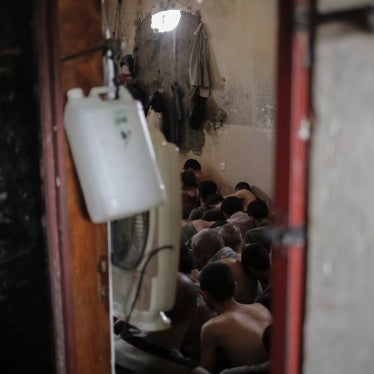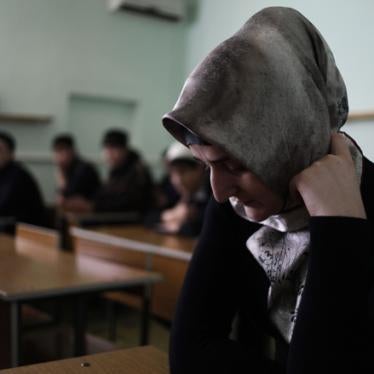It is unlawful for the United States to hold detainees in Iraq without charge or trial while claiming it has transferred sovereignty to an Iraqi government.
On June 14, the U.S. military in Baghdad said that the United States will continue to detain without charge some 4,000 to 5,000 prisoners deemed a threat to the coalition even after the declared transfer of sovereignty on June 30.
The 1949 Geneva Conventions permit the detention without charge of prisoners of war and other detainees only in the case of an international armed conflict—which by definition is between governments—or an occupation. Washington says that both will come to an end on June 30, meaning that the ongoing conflict between the Iraqi government and Iraqi insurgents would become a civil war. That a sovereign government may seek assistance from foreign governments does not transform a civil war into an international conflict. In the absence of an occupation or an international conflict, no one can be detained under international humanitarian law without being charged with a recognized crime. Those not charged must be released and repatriated “without delay.”
“The Bush administration can’t have its cake and eat it too,” said Kenneth Roth, executive director of Human Rights Watch. “If the occupation is over, so is the U.S. authority to detain Iraqis without criminal charges.”
Human Rights Watch has long called for the prosecution of former Iraqi officials responsible for war crimes and other serious violations of international law. Saddam Hussein, in particular, should also be charged with genocide and crimes against humanity. However, it is essential that these legal proceedings are conducted with scrupulous respect for international human rights and humanitarian law.
“The trials of Saddam Hussein and his henchmen will provide an opportunity to end impunity in Iraq and build the rule of law,” said Roth. “But the Bush administration risks perpetuating lawless rule in Iraq if it holds Iraqi detainees in violation of the Geneva Conventions.”
At a U.S. Defense Department news briefing on June 15, the United States provided two rationales for its decision to continuing holding detainees after June 30.
First, a senior advisor to the Coalition Provisional Authority, Dan Senor, asserted that Saddam Hussein, as a prisoner of war, would not have to be transferred to Iraqi authority until there is a “cessation of active hostilities.” However, the Geneva Convention rules allowing the detention of POWs apply only during international (intergovernmental) armed conflicts. If sovereignty is indeed transferred to the interim Iraqi government on June 30, hostilities thereafter would no longer be intergovernmental. There is no concept of POW for internal, or civil, wars. International humanitarian law requires that captured enemy combatants in civil wars to be charged as criminals or released.
Second, Brigadier General Mark Kimmitt claimed that the United States has the “authority and the responsibility to remove and to detain imminent security threats here in Iraq” even after the declared transfer of sovereignty. But if sovereignty is really transferred, Kimmitt’s statement is a misreading of international humanitarian law, which grants these detention powers only in the case of an international (intergovernmental) armed conflict.
U.S. President George W. Bush, speaking to the press on June 15, mentioned a third rationale for the United States to continue to detain Saddam Hussein after June 30: providing appropriate security for the former Iraqi leader. The security of detainees is a valid concern, but it is not grounds for holding them without charge or trial. A sovereign Iraqi government is certainly entitled to invite the United States to hold Saddam Hussein for security purposes, but that does not obviate the need to charge him criminally if his detention is to be legal.
It bears noting that it is not necessary that detainees be put on trial immediately. Rather, it is sufficient that they are criminally charged, and that their trial is scheduled for a reasonable time thereafter. However, in light of the still-rudimentary state of the Iraqi judiciary, questions remain about whether it is capable of filing even preliminary criminal charges against the detainees.
The problem stems from the Bush administration’s aversion to a greater international role in the justice process for fear that it would indirectly bolster the International Criminal Court. A mixed national-international court involving both Iraqis and international jurists with expertise in conducting complicated cases of genocide and crimes against humanity would have avoided many of the problems of building a wholly Iraqi process virtually from scratch.
“If Iraq’s nascent justice system can’t file even preliminary charges against Saddam Hussein and his cohorts, it’s time to rethink the Bush administration’s ideological aversion to an international role in a criminal tribunal for Iraq,” said Roth.







